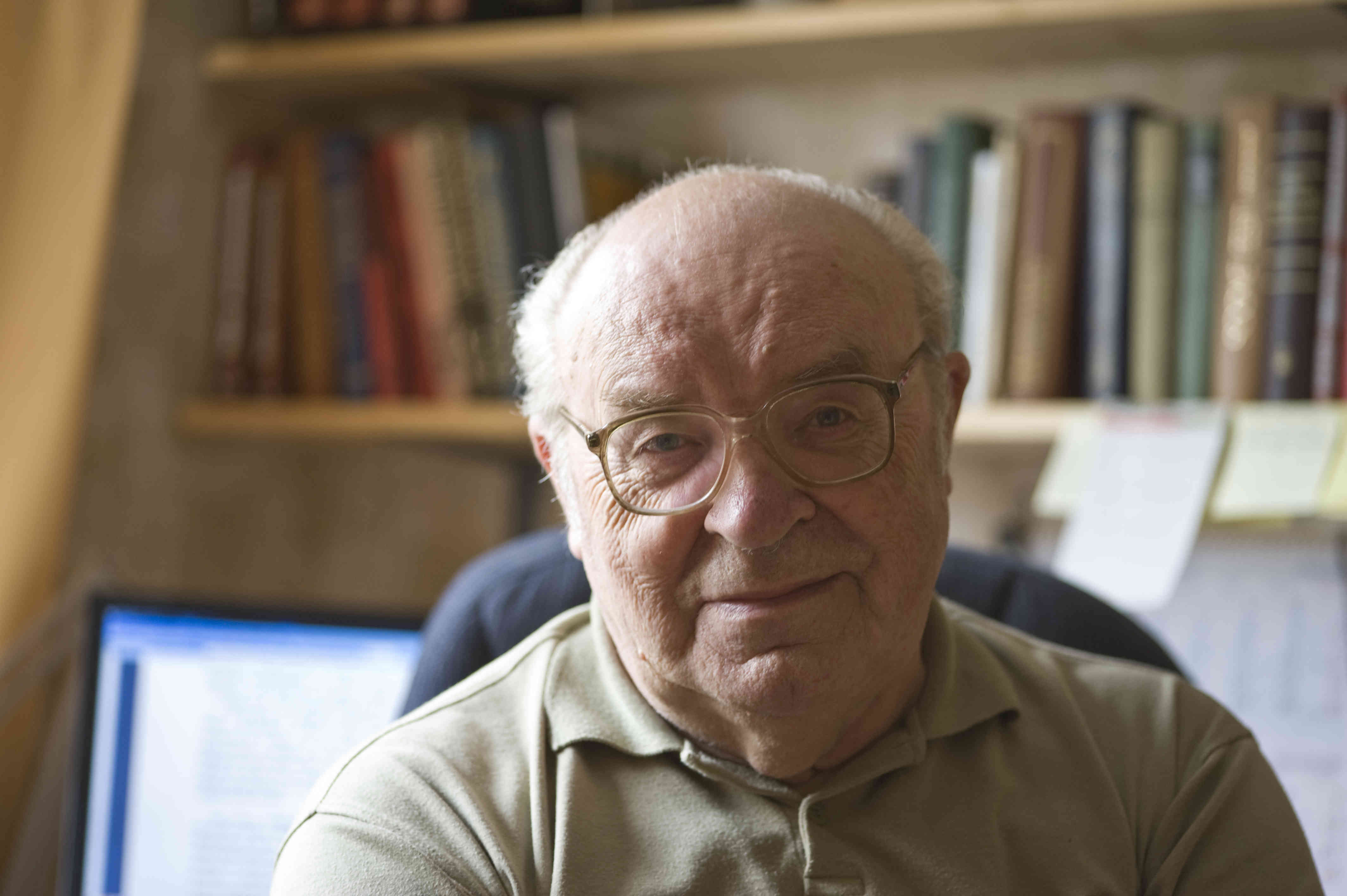
Erik Tohvri
Erik Tohvri (given name Hans-Erik Laansalu, born Hans-Erik Siemann-Toffry, 22. III 1933 – 12. VI 2020) was an Estonian writer, one of the most popular prose authors of the first decades of this century.
Erik Tohvri was born in Rakvere, the son of a soldier of German and Swedish extraction; his mother was Estonian. His paternal grandfather, the sea captain Michael Siemann-Toffry, born in Haapsalu, was the honorary consul of the Republic of Estonia in Liepāja, Latvia in the nineteen-twenties. Three years after his birth his parents separated, and Erik was brought up by his maternal grandparents, and acquired their surname.
Erik Tohvri attended school in Rakvere, and from 1947 to 1951 studied electrical engineering at the Electromechanical School in Tallinn. For his whole life he worked in jobs associated with electricity. He was an energetics specialist, a duty dispatcher for the electricity network, chief engineering designer at the company Harju Elekter, and chief executive of the company ABB HE.
Even as a schoolboy Erik Tohvri was interested in literature and made his first efforts at writing something. However, on the example of his uncle he chose a career involved with technology. In later life Tohvri regretted that the humanities were not among the subjects he studied.
His first writings, mainly radio plays, were produced under the name Hans Laansalu; only later did he choose the pseudonym Tohvri, a variation on his given surname at birth.
Erik Tohvri wrote 12 radio plays, short stories, humorous sketches, a script for the film Pihlakaväravad (‘The Rowan-tree Gates’, 1981, directed by Veljo Käsper). After retirement he mainly wrote novels. He was an extremely prolific writer: over thirty novels flowed from his pen. Once retired, he wrote at the rate of almost one novel a year. His literary language is simple and his subjects are demotic; the works are often autobiographical, but he always gave his prototypes new names. The number of his works and their ease of reading made Erik Tohvri a favourite with library reader. He was rarely granted praise from the critics or public recognition. The only award he won was the Tammsaare prize (in 2006 for for his novel Kaldaliiv, ‘Sandy Shore’).
L. P. (Translated by C. M.)
Books in Estonian
Novels
Majad jõe ääres. Autobiograafiline romaan. Tallinn: Olion, 2001, 254 lk. [2. trükk: 2007.]
Kollaste lehtede aegu. Tallinn: Varrak, 2002, 399 lk.
Tants läbi rukki. Tallinn: Varrak, 2003, 229 lk.
Kaksikelu. Tallinn: Eesti Raamat, 2003, 317 lk.
Kasevälja. Tallinn: Varrak, 2003, 262 lk.
Lummetallatud rada. Tallinn: Varrak, 2003, 302 lk.
Elutöö. Tallinn: Varrak, 2004, 247 lk.
Kodumaja. Tallinn: Varrak, 2004, 223 lk.
Lepavere mõis. Tallinn: Varrak, 2004, 278 lk.
Kaldaliiva. Tallinn: Varrak, 2005, 244 lk.
Äravalitu. Esimene raamat. Tallinn: Varrak, 2005, 358 lk.
Äravalitu. Teine raamat. Tallinn: Varrak, 2005, 303 lk.
Sügisvalgus. Triloogia 1. osa. Tallinn: Varrak, 2005, 251 lk.
Tuisune talv. Triloogia 2. osa. Tallinn: Varrak, 2006, 247 lk.
Arglik kevad. Triloogia 3. osa. Tallinn: Varrak, 2006, 245 lk.
Mürgiliblikas. Tallinn: Varrak, 2007, 236 lk.
Rannal õitseb kibuvits. Tallinn: Varrak, 2008, 271 lk.
Kodutute küla. Esimene raamat. Ümberasujad. Tallinn: Varrak, 2008, 359 lk.
Kodutute küla. Teine raamat. Sulasest sai peremees. Tallinn: Varrak, 2008, 358 lk.
Kodutute küla. Kolmas raamat. Pilvine taevas. Tallinn: Varrak, 2009, 343 lk.
Kodutute küla. Neljas raamat. Läänetuul, taeva luud. Tallinn: Varrak, 2009, 348 lk.
Laenatud rõõmud. Tallinn: Varrak, 2010, 261 lk.
e-armastus. Tallinn: Varrak, 2011, 222 lk.
Naabrid. Tallinn: Varrak, 2011, 219 lk.
Mere taga. Tallinn: Varrak, 2012, 231 lk.
Kaamos. Tallinn: Varrak, 2013, 212 lk. [Järg romaanile ‘Mere taga’.]
Veel on aega. Tallinn: Varrak, 2014, 253 lk.
Ühe katuse all. Tallinn: Varrak, 2014, 221 lk.
Hingevõlg. Tallinn: Varrak, 2015, 215 lk.
Irdabielu. Tallinn: Erik Tohvri, 2016, 267 lk.
Äri ja armastus. Tallinn: Varrak, 2016, 247 lk.
Sõbrad ja hallikirju koerake. Keila: Erik Tohvri Romaan, 2017, 278 lk.
Elupõletajad. Keila: ET, 2019, 200 lk.
Short stories
Laanekuru saaga. Lühiproosat läbi aegade. Keila: Erik Tohvri Romaan, 2018, 255 lk.
Screenplay
Hans Laansalu, Tuuline saar. Mängufilmi stsenaarium. Tallinn: Perioodika (Loomingu Raamatukogu), 1982, 70 lk.
Non-fiction
Peeglikillud. Meenutusi elust ja kirjutatust 1933-2006. Tallinn: Varrak, 2006, 379 lk.



